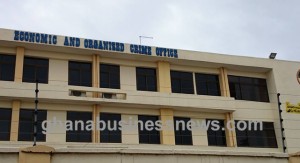EOCO ‘monster’ tag is rapidly fading out – Director
 Mr Kwasi Korankye Amoah, the Executive Director of the Economic and Organised Crime Office (EOCO), says the “monster” tag associated with EOCO is rapidly fading out.
Mr Kwasi Korankye Amoah, the Executive Director of the Economic and Organised Crime Office (EOCO), says the “monster” tag associated with EOCO is rapidly fading out.
The move was necessitated by the implementation of a Charter that allowed members of the public to freely interact with the Office.
He said in the past, people saw EOCO as a mysterious institution and “no-go-area”, therefore whenever it invited someone to answer questions regarded a complaint received for investigation they were often accompanied by their lawyers.
In view of that, he said, the Attorney-General’s Office introduced a Charter that enabled the public to lodge a complaint with the Office and later enquired about the stage of investigation, which EOCO was obliged to inform the complainant how far it had gone with investigations.
The EOCO Boss made the revelation during the signing of a Memorandum of Understanding (MoU) between the Public Interest and Accountability Committee (PIAC) and EOCO, in Accra, on Monday.
“That “monster” system is fading out rapidly. In the Charter, you lodge your complaint with us and you later come and ask the state of the complaint that was reported, and we have every right to tell you where we have reached and where we’re going,” Mr Amoah said.
The EOCO Boss said the law establishing the Office mandated it to investigate financial matters affecting the State, including tax evasions, money laundering and serious offences that affected the nation.
He used the occasion to deny media report that he had been sacked, saying that, he signed a contract with government after the mandatory retirement age of 60 and the contract would soon expire.
The signing of the MoU would enable the two institutions to collaborate towards safeguarding the revenues from petroleum and prevent criminal abuses. It would aid in combating economic and organised crimes relating to the management and use of the country’s petroleum revenues.
It would also ensure efficient, transparent and accountable management of the country’s petroleum revenues to support national infrastructural development and welfare of the people, Mr Amoah pointed out.
Mr Amoah said EOCO had collaborated with other international agencies like the Economic and Financial Crime Commission (EFCC) of Nigeria and some local State agencies to unravel financial malfeasance.
He gave the assurance that it would work together with PIAC and sometimes invite them to join the investigations so that it would have idea of the outcome of the investigation.
They agreed to investigate the utilisation of the petroleum revenue from 2011 when the nation began receiving funds from petroleum exploration.
Consequently, all monies accrued to the State would be accounted for, while persons or institutions found culpable would be dealt with in accordance with law.
Dr Steve Manteaw, the Chairman of PIAC, outlined the terms of reference of the Agreement as follows:
PIAC would invite EOCO to the launch of its semi-annual and annual reports, submit copies of the Report to EOCO, highlighting relevant sections that require consideration and further investigate and furnish EOCO with accompanying documents that related to the highlighted sections.
Additionally, PIAC would avail itself to EOCO during investigations, where and when necessary, while EOCO is supposed to update PIAC at regular intervals on the progress made on its investigations.
Consequently, upon the conclusion of its investigations, EOCO is supposed to submit a formal report to PIAC, highlighting its investigative findings and intended actions.
However, the MoU would not restrict PIAC from participating in similar activities or arrangements with other entities or government agencies.
The agreement would last for five years from the date of signature, unless revised or terminated by written agreement of the Parties and they might review the provisions of the MoU annually for successful implementation.
Source: GNA
